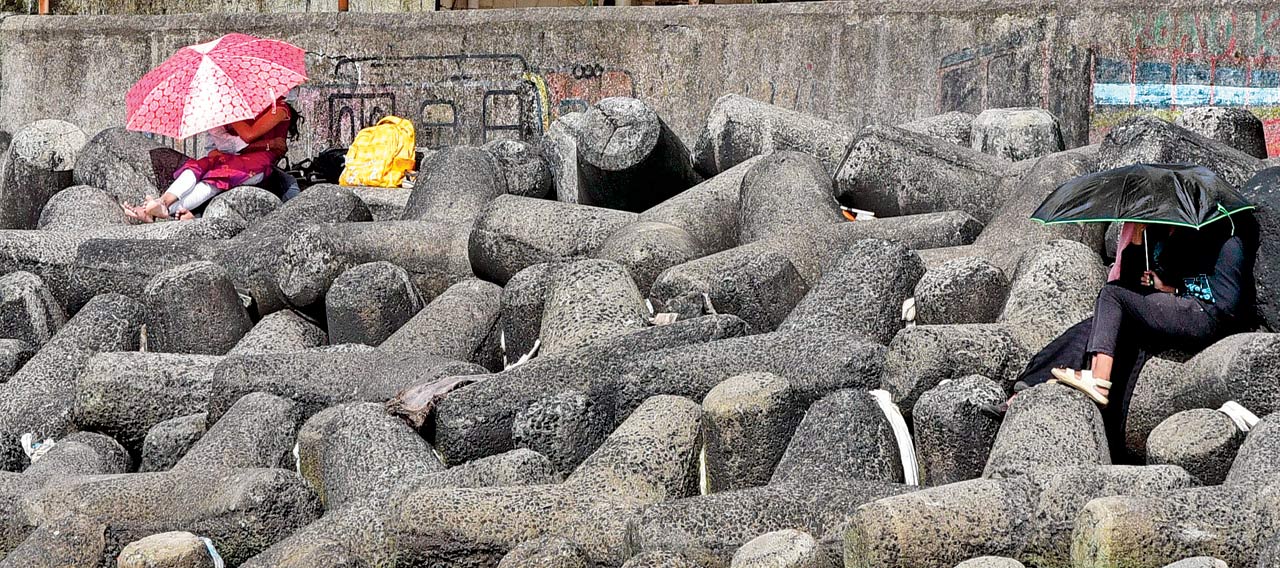It’s 2025, and once again, unmarried couples are being turned away at the inn door. OYO Rooms, once a go-to for couple-friendly hotels, has now backtracked on its policy, sparking a heated debate

Locked out and no place to go. Pic/Satej Shinde
Aakanksha Sadekar recounts the familiar sting of judgment. Any time she walks into a hotel lobby with her partner, she notices a subtle shift in the air—a collective glance, and then the burning question: “Are you married?” She usually fakes, “Yes.” Swiftly comes a counter, “Then why the different surnames?”
ADVERTISEMENT
This week, OYO Rooms, the disruptor that once championed the freedom of couples, announced that its hotel doors would remain shut for unmarried couples in Meerut, Uttar Pradesh. Depending on feedback, OYO is likely to extend this policy to other cities as well. Fuelling this, Bajrang Dal submitted a proposal to Bruhat Bengaluru Mahanagara Palike (BBMP) Commissioner Tushar Girinath and the Bengaluru City Police Commissioner B Dayananda, appealing that the OYO Rooms policy come into effect at their hotels in Bengaluru as well.
 Rocky road for romance. Pic/Shadab Khan
Rocky road for romance. Pic/Shadab Khan
OYO, a haven for young love and fleeting escapes, launched in 2013 with the promise of liberation. It now claims that its latest policy is an adaptation to local social norms and feedback from civil society groups. This backtracks from its initial guarantee to provide unmarried couples with safe and hassle-free check-ins, and has evoked a good deal of online debate.
However, for now, the OYO app continues to offer a “relationship” mode that shows couple-friendly hotels in cities where this policy does not apply yet, while their website elaborately answers what everyone’s asking: Can unmarried couples stay in hotels in India?
 Will doors close for couples in other places too? Pic/Bipin Kokate
Will doors close for couples in other places too? Pic/Bipin Kokate
The website quotes legal sources and news reports to confirm that no law prohibits anyone from staying together or checking into a hotel together. It highlights that guests need to be 18 years of age and should have a valid ID card to check in. Siddharth S Chandrashekhar, Advocate and Counsel, Bombay High Court, confirms, “There is no law that prevents unmarried couples from renting a room in a hotel, renting a house, nothing of that sort—locally or otherwise. OYO’s policy is absolutely discriminatory. But the thing is, it is their [OYO’s] internal policy. Until it’s challenged before a court, it stands.” However, couples caught canoodling in public places can be charged with a case of public indecency under section 294 of the Indian Penal Code (IPC).
Then where should couples go? “We have never faced any issue in Mumbai or otherwise,” say Arun and Neha (names changed), adding, “But we are a privileged urban couple. This may not be the case for many unmarried partners looking for hotels in smaller cities.” The two say that they usually book hotels after checking whether it’s couple-friendly, clean, and in a safe neighbourhood. In case they don’t find any, Airbnb comes to the rescue.
 Unmarried? No occupancy!
Unmarried? No occupancy!
For Sadekar, whose partner travels to smaller cities in North India frequently for work, booking a hotel room has become the norm. “I have faced issues in Mumbai, Delhi, Goa, Jhansi, Amritsar, and even Meerut. We usually book rooms from hotel booking sites, but while checking in, you can tell from the attitude of the staff that you are not welcome,” she says. It’s why Sadekar has resorted to answering “yes” anytime she’s asked if she is married. “I am 36, so if I say I’m not married, they ask more questions that I don’t want to deal with,” she laughs.
Barring couples from hotels, though, is often at the discretion of hotel owners and managers. “Rights of admission reserved” is a common policy that all hotels follow. However, it’s always unmarried couples who are singled out to bear the brunt of moral policing.
On August 8, 2015, mid-day had broken the story of how the Mumbai Police had rounded up 40 couples at hotels in Madh Island and Aksa. Couples were humiliated and charged for “indecent behaviour”, and were released once they agreed to call their parents. It led to a public furore and prompted the then Commissioner of Police, Rakesh Maria, to order the cops to leave the city’s lovers alone.
Later on February 21, 2018, mid-day reporters Faizan Khan and Anamika Gharat did a test drive following complaints from readers. The two reporters went undercover to 18 hotels and only five gave rooms to local unmarried couples. The reporters were able to find rooms primarily at Juhu’s 5-star hotels without any uncomfortable questions or moral policing.
Naturally, not every couple can afford that luxury. Couples then often end up shelling out quite a bit of money looking for clean hotels in safe neighbourhoods. “We often have to check into hotels that cost three to five thousand for a night, which is still reasonable. But it can burn quite a hole!” say Arun and Neha. The couple has begun resorting to Airbnbs any time they cannot find a hotel that will accommodate them. “I understand that for hotels it’s a safety issue. As long as we are checking in with valid ID proof, what’s the problem?” asks Arun, while Neha adds, “A male-female couple are not always in a room to be intimate. Why do I need to be married to someone to share a room? I could be on holiday with a male friend and might want to share a room to save costs. Or I could be travelling for business with a colleague and be comfortable sharing the room.”
In the 2019 exposé by mid-day, most hotels denied rooms to our reporters on the claim that the local cops had asked them to do so. However, upon questioning the Mumbai Police at the time, it was revealed that no such instructions had been passed.
Why, then, are couples locked out? And, what nuisance do they cause to hotels? The Hotel and Restaurant Association of India refused to comment on the matter.
With Airbnb in India, the stance is similar. It’s up to the host to allow unmarried couples to book stays. However, several hotel listings do specify that unmarried couples with local IDs are welcome. In the age of staycations, it would be rather odd to deny couples a weekend getaway in their city, no? Advocate Chandrashekhar offers hope, emphasising that, “Supreme Court and the law have recognised unmarried couples such as live-in couples having a legal relationship—then who is a private entity (such as OYO Rooms in this case) to stipulate that only legally married couples can rent their rooms as guests?”
In 2025, OYO’s switch to position itself as family-friendly in Meerut stands out like a sore thumb. Reports by industry experts on the subject speculate that the company might lose its progressive customer base and instead attract a more conservative demographic in tier 2 and tier 3 cities. Whether this will work in OYO’s favour, only the next financial year’s reports can tell.
As for now, the company recorded a net loss in the financial year 2023-24 compared to the previous year. According to the company’s financial statement, its operational revenue declined by 15 per cent, falling to R1,112.83 crore as of March 2024, compared to R1,312.61 crore in the previous year.
For now, couples travelling to or residing in Meerut will have to provide valid proof of marriage at the time of checking into an OYO Rooms hotel. “Yes, this means couples will have to carry around their marriage certificate,” says Chandrashekhar.
“It just feels ridiculous. OYO was supposed to be for couples. They have built their entire business on this,” concludes Sadekar.
15%
Decline in OYO’s revenue, which touched R1,112.83 crore in March 2024, against R1,312.61 crore in the previous year
 Subscribe today by clicking the link and stay updated with the latest news!" Click here!
Subscribe today by clicking the link and stay updated with the latest news!" Click here!







